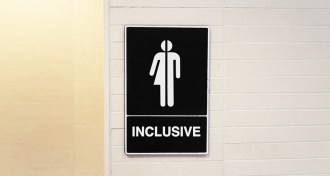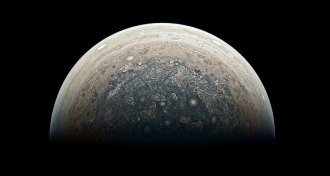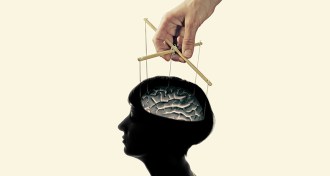Science & the Public
Where scienceand society meet
Sign up for our newsletter
We summarize the week's scientific breakthroughs every Thursday.
-
 Science & Society
Science & SocietyOnline reviews can make over-the-counter drugs look way too effective
Online patient reviews put a far more misleading spin on medications than clinical trials do.
By Bruce Bower -
 Science & Society
Science & SocietyData-driven crime prediction fails to erase human bias
Software programs that predict where crimes will occur don’t eliminate bias; they exacerbate it.
-
 Humans
HumansTransgender children are at greater risk of mental health problems
The Trump administration has rescinded federal protections for transgender kids in public schools, a move that the American Academy of Pediatrics condemns.
-
 Astronomy
AstronomyCitizen scientists are providing stunning new views of Jupiter
A camera aboard NASA’s Juno spacecraft is giving citizen scientists a crack at discovering never-before-seen features of Jupiter.
-
 Science & Society
Science & SocietyTrump administration clampdowns on research agencies worry scientists
Mixture of bans on federal research communications create confusion and fear.
-
 Psychology
PsychologyYou’ve probably been tricked by fake news and don’t know it
In the fight against falsified facts, the human brain is both the weakest link and our only hope.
-
 Tech
TechObama worried about research funding
Barack Obama offered yet another argument about why the current federal-budget stalemate is so risky: “[T]he sequester, as it’s known in Washington-speak — it’s hitting our scientific research.” As things now stand, “we could lose a year, two years of scientific research as a practical matter, because of misguided priorities here in this town.”
By Janet Raloff -
 Humans
HumansU.S. team breaks through subglacial lake
Testing should continue for a day or more, probing for life in the Antarctic depths.
By Janet Raloff -
 Tech
TechAntarctic test of novel ice drill poised to begin
Any day now, a team of 40 scientists and support personnel expects to begin using a warm, high pressure jet of water to bore a 30 centimeter hole through 83 meters of ice. Once it breaks through to the sea below, they’ll have a few days to quickly sample life from water before the hole begins freezing up again. It's just a test. But if all goes well, in a few weeks the team will move 700 miles and bore an even deeper hole to sample for freshwater life that may have been living for eons outside even indirect contact with Earth’s atmosphere.
By Janet Raloff -
 Humans
HumansThis snowbird is really going SOUTH
Many people of a certain age (like my folks) enjoy flying south to warmer climes when winter weather threatens. I’m also flying south this December — but not to warm up. As a guest of the National Science Foundation, I’ll be checking out summer in the really deep South: Antarctica. Temps expected at certain sites I’m scheduled to visit, such as the South Pole, threaten to surpass the worst that my hometown will encounter in the dead of winter.
By Janet Raloff -
 Animals
AnimalsEpidemic of skin lesions reported in reef fish
A British-Australian research team has just found coral trout living on the south side of the Great Barrier Reef sporting dark skin raised, scablike, brown-black growths. Although the authors believe they’ve stumbled onto an epidemic of melanoma — a type of skin cancer — other experts have their doubts. Strong ones.
By Janet Raloff -
 Humans
HumansSo long Weekly Reader . . .
I read with sadness this week that Weekly Reader is about to disappear. As much as I’ll miss the idea of the venerable Weekly Reader living on, I also have to admit to a bit of a love/hate relationship with it. This conflict developed shortly after I joined the staff here. As soon as I identified my affiliation, people frequently asked: “Science News — hmmm: Isn’t that the Weekly Reader of science?”
By Janet Raloff